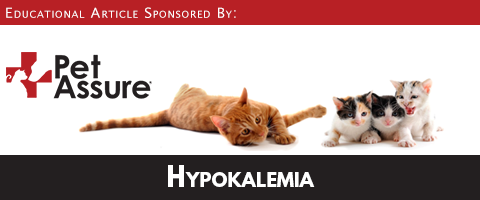Hypokalemia is a low amount of potassium in the blood.
Potassium isa vital nutrient in every cell that supports nerves, muscles, digestion, and the heart.
The kidneys get potassium through food andexcrete it through urine. When the amount of potassium gained and lost is equal, the potassium level is normal.
CAUSES:
The most common cause is kidney failure. Other causes include:
- Liver disease
- Diabetes
- Cushing’s Disease
- Hyperthyroidism
- Persistent vomiting, diarrhea
SIGNS:
Mild hypokalemia may not cause any noticeable signs. However, if severe hypokalemia develops, it can have life-threatening effects.
Signsmay include:
- Muscle weakness, especially in the neck
- Lethargy
- Loss of appetite and weight loss
- Increased thirst and urination
- Dehydration
- Non-groomed hair
DIAGNOSIS:
Some tests your veterinarian may perform:
- Blood tests: to check for hypokalemia and any underlying diseases
- Biochemical profile: a blood test to check for kidney failure & diabetes
- Urinalysis: to check for kidney failure
- EKG: to check how the heart was affected
TREATMENT:
Most veterinarians will recommend the following treatments for cats with hypokalemia:
- Treatment of the underlying cause
- Oral or injected potassium supplements
- Follow up visits to monitor potassium levels
PREVENTION:
Feed your cat a high quality diet, and give potassium supplements if recommended by your veterinarian.
PROGNOSIS:
Potassium supplements are often needed for life.



